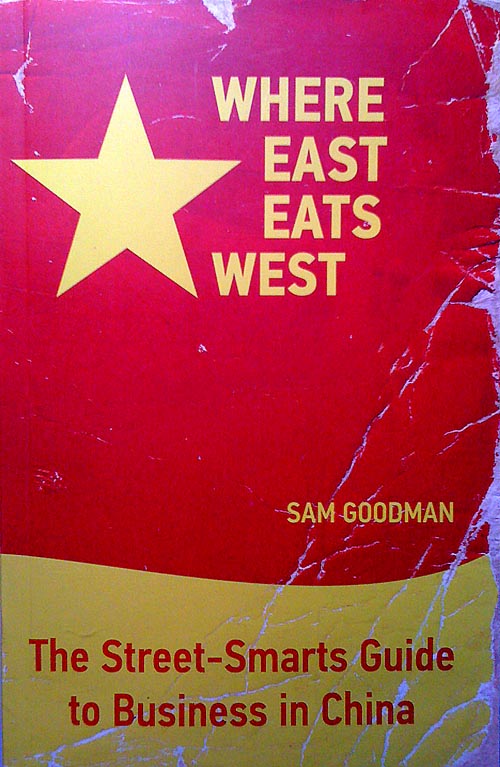Where East Eats West: The Street-Smarts Guide to Business in China by Sam Goodman (BookSurge)
Asia By the Book welcomes our newest reviewer, Len Lee, a lifelong resident of Chengdu and a senior at Tian Fu College of Southwestern University of Finance and Economics, where he majors in Finance.
After I finished reading Where East Eats West, I had a feeling that I had not read a book. Instead I felt as if I had watched a movie where a foreigner came to China, learned the language, came up with an idea to start a business, faced various problems, found a way to solve them, and in the end wrote a book that summarized his experiences.
Where East Eats West
I have to say Sam Goodman is some kind of Chinese expert who hasn’t wasted the years that he has spent in China. In this book, Sam uses simple and short words to tell us how to do business in China, He explains the meaning of “face,” how to get Guanxi (relationships), how to deal with the government and so on. It is a very, very pragmatic book and useful not only for a foreigner who wants to come to China and do some business, but also for the Chinese. I have to admit, as someone who is Chinese, I have never read a book before which introduces Chinese business practices in such a simple and clear way until I read this one. You can easily understand this book; more importantly, you can use it.
Although Sam does a great job, there are some places where I don’t agree with him. In his book, Sam uses several chapters to talk about Guanxi: what it is and how to get it. As far as I’m concerned, in reality, we would never talk about it or use it in such a direct fashion. We view Guanxi as an art which needs wisdom and which is not that easy.
At present, more and more people don’t talk about “Guanxi”, but instead use a new term, “Zuoren”----how to be a person, or how to conduct yourself well. This is because now people see Guanxi as a derogatory term while “Zuoren” is not. It means first you should know things well within yourself; then you will be able to do things well externally. As a result, people will like you and help you.
Later in his book, Sam says ‘In mainland China, the “teamwork” model prized in the west is virtually non-existent‘. Based on my comprehension, I interpret that to mean ‘As the author sees it, Chinese people do not have the “teamwork” spirit.’
Are you ^@#$ kidding me, Sam??!!! You should take a look at the latest Chinese military and civilian parade at Tian’anmen square which celebrated the 60th anniversary of the founding of the People’s Republic of China. How much teamwork was displayed by these participants!
If you don’t agree with that, let’s look at the Beijing Olympic Game’s organizing work. The president of the IOC (International Olympic Committee) has said many times that the Beijing Olympic Games will be seen as the most successful Olympic Games ever. I think Chinese people have the strongest spirit of teamwork in the world. And don’t forget that China is a socialist society who admires groups and teams. It is not that the teamwork model doesn’t exist in China, it is you, Sam, who doesn’t find it.
As for what Sam sees as a lack of creativity, and an inability to face problems among Chinese people, these are not the real issues. In my opinion, the issue is the author doesn’t know how to bring out the teamwork spirit of his Chinese employees. To help him do this, I suggest that Sam learn from the Chinese Communist Party.
At last, I want to say that as a foreigner, Sam has a high level of knowledge about the Chinese language and Chinese culture. He can be an example that I can learn from and Where East Eats West could be—with a little more understanding of Guanxi and Chinese teamwork-- a good book that foreigners can learn from.--Len Lee
